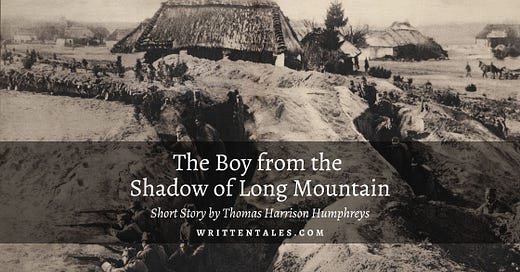If you enjoy this feature and would like to see more, let me know with a comment, 💌 share, ♥️ like, or better yet, a 🔄 restack!
You can purchase Written Tales Magazine in print or digital, or become a paid subscriber and download your favorite editions. To view our upcoming stories & poems, please visit our publishing schedule calendar.
Almost long ago, just a bit more than a century in fact, and specifically upon the eleventh hour of the eleventh day of the eleventh month in the year of 1918, the world at last experienced a silence it had not heard in more than four years. The guns of war were now quiet, and Private Walter O. Finch was listening hard in hopes that this profound silence might persist. Walt had been born in Campbell County, in the shadow of Long Mountain to the east and just south of the renowned Fountain Hotel, a one-time inn established by a great uncle of his. When World War I erupted in 1914, Walt was already eighteen years old and was holding down a job in a sawmill near the county’s southern region of Castle Craig. And when President Woodrow Wilson established a draft in preparation for war in December of 1917, Walt found himself suddenly a soldier in the American Expeditionary Force. More than 3,700 young men hailing from Campbell County would eventually serve in the war. And so, alike those many others, in 1918, Walt stood by a waiting train and said his goodbyes to his family.
But all of that was four years ago. Now, there was the promise of peace … and home. The Allied assault along the Meuse River and through the Argonne Forest had been successful and at about 5:00 am on the eleventh of November, the Germans had besought a truce. In Allied camps all along the Argonne lines, feelings of jubilance were accompanied by sneers of skepticism, as many were unsure the truce could be trusted. This suspicion was especially real among American commanders who were certain it was best to continue their unyielding assault, that the Germans might know just how serious the Allies were about the terms of the Armistice. And so, there was only a short hour of reprieve known to Walt and his unit just before their own guns were heard bellowing again. In that time, Walt wrote a letter home to his sister and placed it in the company’s outgoing post. The correspondence went like this:
Dearest Margaret,
I know I have not written home often enough, but I have so feared any promise of my return may prove false that I wanted to wait until a more certain time to write. But my dear Margaret, that time has come. You will have heard all about my liberty by the time you get this letter. But I wanted you to hear, in my own astonished voice, that the War now seems to be over. It is done and I shall soon be home again with you and Mother and Father in the shadow of Long Mountain. I know it has not even been a year, but these eight months have been the most harrowing of my life; yet I know I was meant to be a part of it all. Regardless the misery, I would not have missed my chance to be here, to perform my part in this world-wide drama, not even had it meant my own life. But now I look forward to finding myself back among those I love and once again returned unto peace. Ah peace, I can hardly remember its like, for every moment I have known here seems one bombarded with the sounds and smells of war. If I am not yet home for Thanksgiving on the 28th, then perhaps by Christmas. Tell everyone I love them and that I will soon see them again in peace.
Love,
Walt
Keep reading with a 7-day free trial
Subscribe to Written Tales Magazine to keep reading this post and get 7 days of free access to the full post archives.




